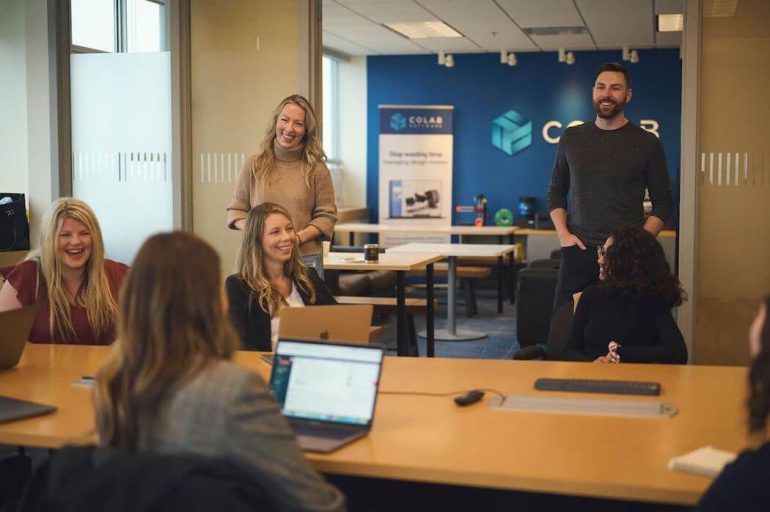In 2023, the team at CoLab wrapped up “one of the most painful processes” they had ever endured.
The St. John’s, Newfoundland-based company had spent days preparing a single Scientific Research and Experimental Development (SR&ED) tax credit claim with a traditional accounting firm.They were then audited, adding another 15 hours of preparation and requiring a dozen developers to join audit calls with the Canada Revenue Agency.
“We actually understand the technology side of it right from the first call.”
Kyla Mireault, Boast
“When we met CoLab, they were just completing the last round of their last audit with their previous SR&ED partner,” explained Kyla Mireault, Director of SR&ED Customer Delivery at Boast. “It probably took more than 100 hours of their time—and they also had to set up individual CRA interviews with at least a dozen members of their development team.”
CoLab is a company that streamlines design processes for its own clients, so the irony of the situation wasn’t lost on them.
CoLab’s Design Engagement System helps engineering teams conduct faster, more effective design reviews on computer-aided design (CAD) models, while using AI to surface lessons learned from past projects and automate routine review tasks.
Where traditional design reviews might be 80 percent administrative work and 20 percent problem-solving, CoLab aims to flip that ratio and enable teams to focus on technical challenges rather than process overhead.
So when it came time to file their next SR&ED claim, CoLab went looking for a provider that shared their approach.
“They wanted to see if there were other people that had a new way of doing things,” Mireault said. “The genesis of CoLab was reinventing a process that hadn’t been touched in decades, and so they thought ‘maybe somebody’s doing the same thing in the SR&ED space.'”
The search led them to Boast, a SaaS platform that uses AI to streamline R&D tax credit filing. According to the company, the contrast was immediate.
Instead of pulling in a dozen developers for lengthy interviews, CoLab brought “at most one or two developers for interviews that lasted 30 minutes max, and that was it.”
More importantly, “in two straight submissions with Boast, they’ve never been audited or had to put time toward defending our claim,” Mireault added.
For Canadian tech companies navigating a challenging funding environment, SR&ED offers something non-dilutive capital that doesn’t require giving up equity or taking on debt.
The program provides refundable tax credits for companies conducting research and development activities, including much of the experimental work that happens in software development. Debugging complex technical problems, developing custom integrations, or building novel features can all qualify—work that many startups are doing anyway.
For CoLab, the time savings were significant, but the real impact came in how CoLab could deploy the recovered funding. SR&ED credits directly enabled some of the platform’s most important new features.
This included Follow Mode, which allows teams to troubleshoot CAD projects in real-time across different locations, even out in the field. The recovered funding also powered CoLab’s Review Notebooks, bringing asynchronous collaboration capabilities similar to Google Docs into the design review environment for the first time.
“I think they’ve been able to not only gain back time, but their claims have been more successful in terms of dollar amounts as well,” Mireault noted. “For a high-growth company at our stage, any additional capital that we can save or bring in is hugely beneficial to our innovation. It means we can hire more people, it means we can work on more projects, and it means we can get cooler stuff out to our customers faster.”
What made the difference wasn’t just process efficiency; it was technological understanding. Many traditional accounting firms treat SR&ED as a compliance exercise, but CoLab found that working with a team that understood SaaS development fundamentally changed the experience.
“It wasn’t just that we were super engaged, it’s that we actually understand the technology side of it right from the first call,” Mireault explained. “It’s probably because we’re also building a SaaS application—and a high technology solution to this problem—so there’s just a lot more of that technological thinking and technology knowledge within the company.”
This technical fluency meant fewer translation barriers between CoLab’s development work and the SR&ED filing requirements. Instead of lengthy explanations about software architecture or development challenges, the conversation could focus on identifying which innovations qualified for credits.
“It’s like: We are building a SaaS solution, they’re building a SaaS solution, we know their space better than any of these other providers, so we’re going to be easier to work with and we’re going to understand the same problems they’re having,” Mireault said.
For development teams already pushing technical boundaries, that combination of efficiency and funding can make the difference between incremental progress and breakthrough capabilities. For team members at CoLab, which partnered on a case study with Boast, the additional capital “means we can get cooler stuff out to our customers faster.”
Paul Davenport is Head of Content at Boast.
If you’re driving innovation in technology, Boast can unlock real value from your R&D. Learn more.
Feature image courtesy of CoLab.




